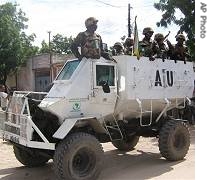2007年VOA标准英语-AU Peacekeepers Killed in Roadside Bomb in Moga(在线收听)
Nairobi
16 May 2007
A hidden roadside bomb exploded in the Somali capital, Mogadishu, on Wednesday, killing four African Union peacekeepers and wounding another five. VOA Correspondent Alisha Ryu in our East Africa Bureau in Nairobi reports that Iraq-style guerilla attacks are on the rise in Somalia.

A.U. peacekeepers from Uganda patrol on an armored vehicle in Mogadishu, 14 May 2007
The African Union peacekeepers, all from Uganda, were on a routine patrol in a neighborhood near the capital's old seaport when the blast tore through their convoy.
It is not known what types of explosives were used in the attack. But witnesses say they were hidden in a pile of garbage and remotely-detonated.
The Ugandans arrived in Mogadishu two months ago as the vanguard of a larger A.U. peacekeeping force. But weeks of vicious fighting between Ethiopian troops and Somali insurgents had largely confined the peacekeepers to their barracks at Mogadishu Airport.
One peacekeeper was killed and four others wounded during the most recent fighting.
The Ugandans started conducting regular patrols in the city two weeks ago, after the interim government and Ethiopian officials declared that the insurgency had been defeated.
The spokesman for the A.U. mission, Ugandan army Captain Paddy Ankunda, tells VOA that the A.U. believes it was not insurgents but terrorists, who carried out Wednesday's attack.
"No organization has claimed responsibility yet, but our intelligence indicates that they are operatives of al-Qaida," he said.
Roadside bombs, frequently used in Iraq and Afghanistan to target U.S. and NATO troop convoys, are also being increasingly used in Somalia.
Somali Islamists, who were driven out of power in late December by Ethiopian troops supporting the country's interim government, had vowed to wage a guerrilla war against the government, its Ethiopian military backers, and peacekeepers in Somalia.
The Somali government, Ethiopia, and the United States believe several top leaders of the Islamist movement had ties to al-Qaida and had been harboring foreign al-Qaida operatives in Mogadishu before they were ousted from power.
But Somalis in Mogadishu say there are no al-Qaida operatives in the capital now. They say the insurgency is being largely waged by Somali nationalists and angry sub-clan members of the locally-dominant Hawiye clan, who feel disenfranchised and discriminated against by the transitional federal government of President Abdullahi Yusuf.
The president, who is a member of the rival Darod clan, is accused, among other things, of placing his relatives and allies in key positions in government to weaken the Hawiye politically and economically.
International donors, including the United States and the European Union, have urged President Yusuf to convene a national reconciliation conference next month with all segments of Somali society, including government opponents.